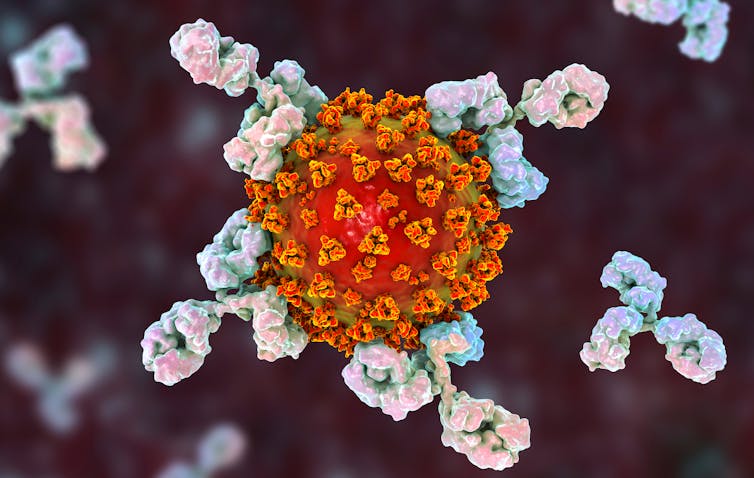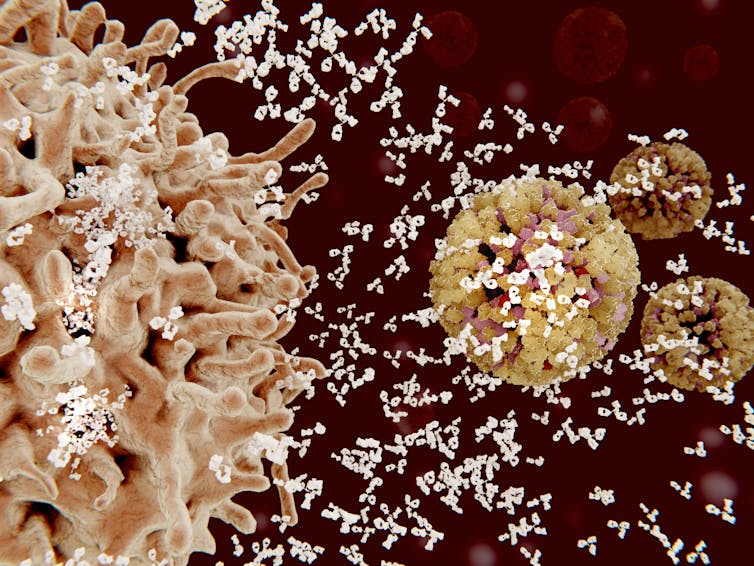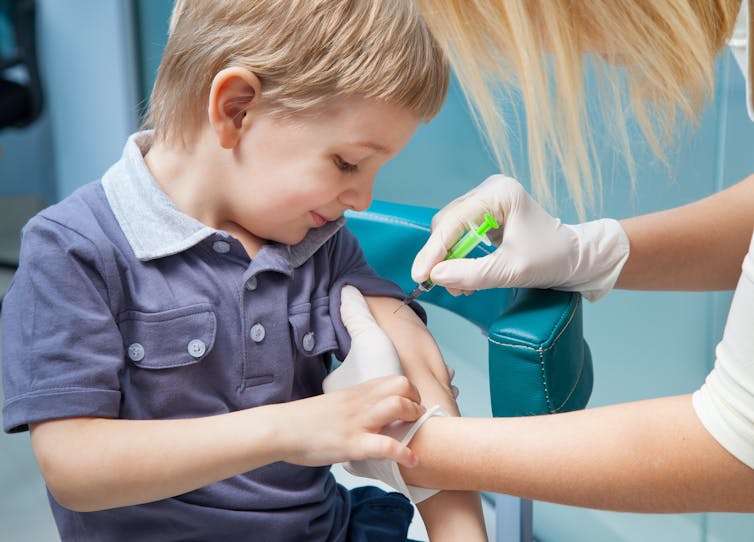Why do antibodies fade after a COVID-19 infection, and will the same thing happen with vaccines?

Kateryna Kon/Shutterstock
Steven David Roland Smith, Brunel University London
The end of the COVID-19 vaccines being rolled retired universal is to stimulate our immune systems into creating a protective response against the coronavirus, particularly by generating antibodies. These antibodies past circulate in our blood until necessary in the future day, attacking and removing the coronavirus quickly from our bodies if we become germy.
The speed with which the knowledge base and medical communities have developed and tested these new vaccines has been extraordinary. However, this short timescale leaves us with some outstanding questions.
Primal among these is how long the protection we receive from vaccination, or indeed from contagion with the computer virus itself, bequeath last. We know, e.g., that antibody levels drop curtain quite promptly following a COVID-19 infection.
How the insusceptible system of rules remembers
Our body's remarkable ability to remember past encounters with infectious microorganisms and retain robust defences against them is due to the phenomenon of immunological memory. This remembering resides in hot blood cells well-known as lymphocytes, of which there are two main types: T cells and B cells.
When the body faces a new challenge – either a new transmission or vaccinum – specific T cells and B cells are recruited to sight with it. "Memory" versions of these specific cells are then unbroken on standby in pillowcase the same issue is encountered again in the future.
It is these B cells that are responsible for releasing antibodies into the blood. When an infection or vaccination occurs, just about of them will metamorphose into specialised antibody-yield factories, called plasma cells.
Antibodies are proteins, and like any other protein leave be naturally broken polish and abstracted from the body inside a few months at near. This is the cause why aegis from antibodies that we experience passively, for example from our mothers in the womb or finished breast milk, does non stopping point very weeklong. For longer-term protection, we take to bring forth antibodies for ourselves.

Juan Gaertner/Shutterstock
Our body's ability to maintain antibody levels following contagion or vaccination is a result of two mechanisms. In the early stages, if retentivity B cells detect any persistent infection or vaccinum, roughly testament continue to turn into brand-new antibody-producing plasm cells.
Once the infection operating theater vaccine has been completely removed, computer memory B cells No longer fill again the plasm cell population, which declines. However, approximately may persist equally long-life-lived plasm cells (LLPCs), which can live for many eld in our marrow, continually manufacturing and releasing large quantities of antibodies. LLPCs aren't e'er created after an contagion, merely if they are, antibodies against a specific infection can be found in the blood for a long fourth dimension after the infection has cleared.
Although we preceptor't up to now fully understand which immunisation conditions are best for generating LLPCs, their presence has been linked to certain locations. For example, a US group discovered that LLPCs appear to prefer the marrow of certain bones supra others. Ten years after tetanus inoculation, LLPCs were found in thighbone, humerus and shinbone bone marrow much Thomas More commonly than that of the ribs, radius, vertebrae or os crest.
Quite why LLPCs prefer the marrow of these bones is not yet lucid. One interesting possibility is differences in the debone marrow fat level. LLPCs were found to be surrounded by large numbers of fat cells in these bones. This suggests that information technology may be bony heart and soul fruitful content that affects the power of LLPCs to move to – and reside long term in – indisputable bones.
Just if LLPCs aren't created, that doesn't mean someone cannot generate more antibodies against a threat if it is encountered again in the future. Providing the person has generated retention B cells, these will pick out the common threat, and in one case once more some will lead off transforming into untested plasma cells, to begin antibody production once more.
Vaccine type affects durability too
There are many reasons why vaccination or contagion do not always provide aegis that is long lasting. Some of this is due to individual variation in our response to a given vaccine. Notwithstandin, the features of vaccines themselves determine the nature of the antibody reaction besides.

INSAGO/Shutterstock
One study found that although a greater balance of individuals who accepted tetanus and diphtheria vaccines developed protective antibodies, these antibodies faded more rapidly than those generated by rubeola, mumps or variola vaccines. The key difference between these vaccines is that those against tetanus and diphtheria contain only isolated proteins (modified versions of the toxins that tetanus and diphtheria bacteria make), whereas the measles, mumps and smallpox vaccines contain live, faded versions of these viruses.
Any people may not produce good responses to liveborn vaccines collectable to pre-existing unsusceptibility to the vaccine itself, having already had a natural infection. Yet, those that do respond well tend to keep off their responses for longer. This is partly receivable to persistence of the live vaccine in the consistence, which encourages the short replenishment of plasma cells. It is also in all likelihood that live vaccines are better at producing LLPCs.
We have already seen that the rate at which antibodies decay following COVID-19 can differ, for instance between men and women. Some of the new COVID-19 vaccines are based on refreshing delivery methods, such as viral vectors Oregon messenger RNA molecules. Clearly these are very in force in their speech of rapid protection. Merely quite a how intimately they will activate memory B cells and LLPCs, imparting durable exemption, remains to be seen.
Steven Smith, Senior Lecturer in Biomedical Sciences, Brunel University London
This article is republished from The Conversation under a Creative Commons licence. Read the original article.
Source: https://hellocare.com.au/why-do-antibodies-fade-after-a-covid-19-infection-and-will-the-same-thing-happen-with-vaccines/
Post a Comment for "Why do antibodies fade after a COVID-19 infection, and will the same thing happen with vaccines?"